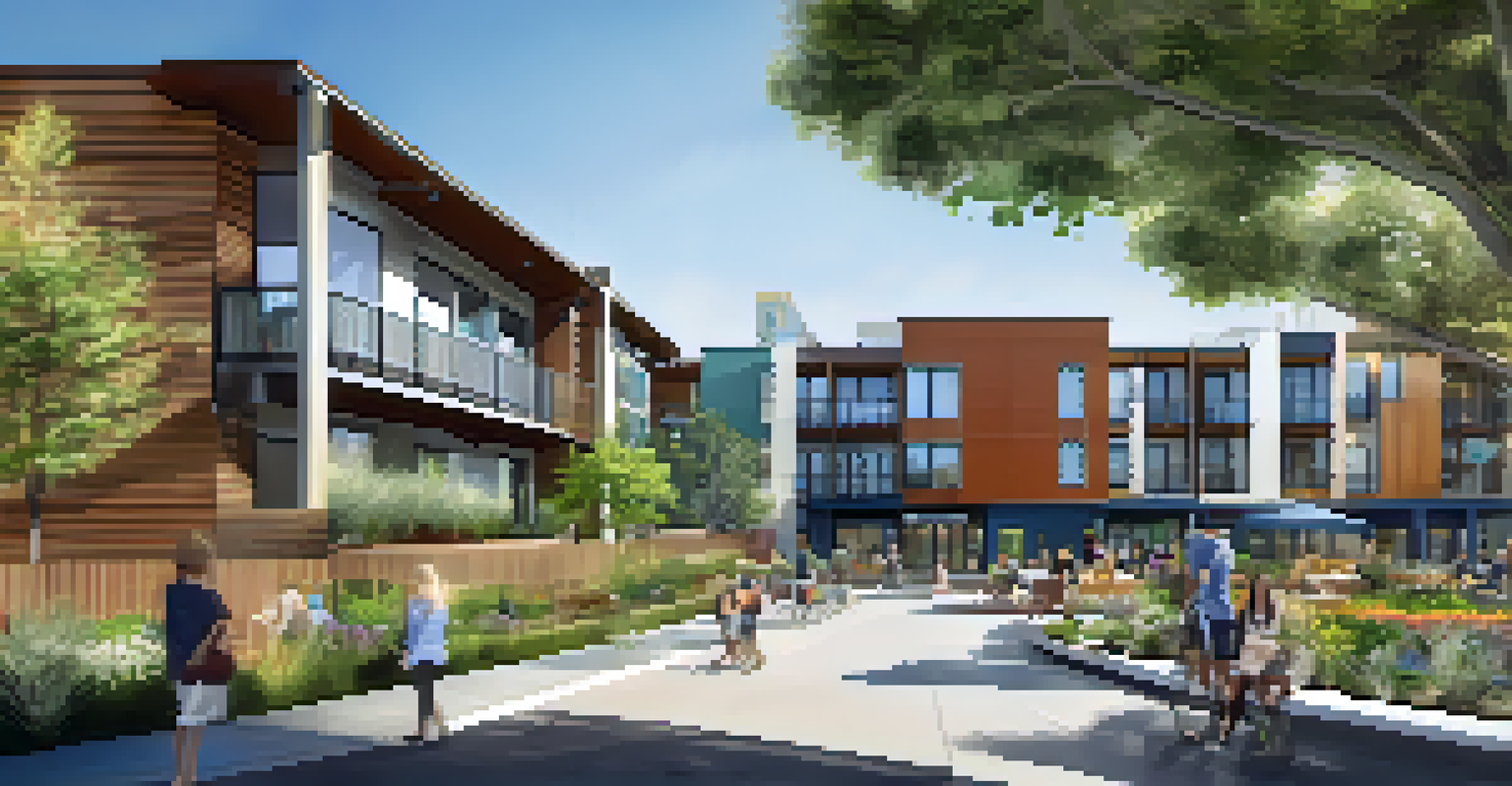The Impact of Affordable Housing Policies on San Jose Communities

Understanding Affordable Housing Policies in San Jose
Affordable housing policies are designed to ensure that all residents have access to housing that fits their budget. In San Jose, these policies are crucial due to the city's skyrocketing living costs, which have made it increasingly difficult for low- and middle-income families to find suitable homes. By implementing various strategies, such as inclusionary housing and rent control, the city aims to create a more equitable living environment for its diverse population.
Affordable housing is a critical part of our city's economic infrastructure. It is about building communities where families can thrive and succeed.
These policies not only focus on preventing homelessness but also work to sustain community development. For example, the inclusionary housing policy mandates that a percentage of new developments be set aside for affordable units, allowing for a mix of income levels within neighborhoods. This approach fosters social cohesion and helps to combat the negative effects of gentrification, where rising rents push out long-standing residents.
Moreover, affordable housing initiatives are often paired with support services, such as job training and financial counseling, to empower residents. By addressing the root causes of housing instability, these policies provide a holistic approach that benefits the entire community, creating a ripple effect of positive change.
The Role of Local Government in Housing Policy
Local government plays a pivotal role in shaping and enforcing affordable housing policies. In San Jose, city leaders have recognized the urgent need for these initiatives and have made them a priority in their agendas. Through the allocation of resources and funding, the local government can support the construction and maintenance of affordable housing units throughout the city.

Additionally, the city can facilitate partnerships with non-profit organizations and private developers to maximize the impact of these policies. For instance, by offering incentives such as tax credits or streamlined permitting processes, San Jose encourages developers to include affordable units in their projects. This collaborative approach not only accelerates housing availability but also ensures that diverse voices are heard in the planning process.
Affordable Housing is Essential
San Jose's affordable housing policies aim to provide budget-friendly homes for low- and middle-income families amidst rising living costs.
Furthermore, the local government must continuously evaluate the effectiveness of these policies. Regular assessments help identify areas for improvement and ensure that the needs of the community are being met. Engaging with residents through surveys and public forums is essential to gather feedback and foster a sense of ownership among community members.
Community Reactions to Affordable Housing Policies
Community reactions to affordable housing policies can vary widely, reflecting a range of perspectives and experiences. Many residents welcome these initiatives as a necessary step towards addressing the housing crisis in San Jose. They appreciate the efforts to create inclusive neighborhoods where families from different backgrounds can thrive together.
We need to ensure that our neighborhoods are inclusive, where everyone can afford to live and contribute to our community. It's not just about housing; it's about creating a vibrant and diverse city.
However, some community members express concerns about the potential impact on property values and neighborhood character. This fear often stems from the misconception that affordable housing will lead to increased crime or a decline in local amenities. To counter these worries, it's essential to highlight success stories from other cities that have successfully integrated affordable housing without compromising community standards.
Open dialogue between policymakers and residents can help bridge these gaps in understanding. By hosting community forums and informational sessions, stakeholders can address concerns, share data, and show how affordable housing can enhance rather than detract from neighborhoods.
Case Studies: Success Stories in San Jose
Examining successful case studies within San Jose provides valuable insights into the effectiveness of affordable housing policies. One notable example is the development of the San Pedro Square Apartments, which offers a mix of affordable and market-rate units. This project not only increased housing availability but also revitalized a previously underutilized area, demonstrating how thoughtful planning can benefit the entire community.
Another success story is the collaborative effort between the city and local non-profits, such as Habitat for Humanity. Their programs focus on building affordable homes while providing families with the tools and resources they need to achieve stability. The positive outcomes from these initiatives highlight the importance of community involvement in driving successful housing policies.
Government's Key Role in Housing
Local government in San Jose prioritizes affordable housing by allocating resources, supporting partnerships, and evaluating policy effectiveness.
These case studies serve as powerful reminders that effective affordable housing policies can lead to thriving communities. By showcasing these successes, San Jose can inspire other cities to adopt similar strategies, emphasizing the importance of collaboration and innovation in addressing housing challenges.
Challenges Facing Affordable Housing Implementation
Despite the positive impacts of affordable housing policies, San Jose still faces numerous challenges in implementation. One of the most significant hurdles is securing adequate funding to support the construction and maintenance of affordable units. With rising construction costs and limited government resources, developers often struggle to create the necessary inventory to meet growing demand.
Additionally, navigating the complex zoning and regulatory landscape can be a daunting task for both local governments and developers. Often, lengthy approval processes and bureaucratic red tape can delay projects, further exacerbating housing shortages. Streamlining these processes while ensuring community input is essential to overcoming this obstacle.
Lastly, public opposition can pose a challenge to the introduction of new affordable housing developments. Some residents may resist changes in their neighborhoods, fearing that new projects could alter the area's character. To tackle this issue, ongoing education and engagement are vital to building understanding and support for affordable housing initiatives.
The Economic Benefits of Affordable Housing
Investing in affordable housing not only addresses social equity but also brings significant economic benefits to the community. When families have stable housing, they are more likely to invest in their local economy, whether through spending on groceries, services, or education. This increased economic activity can stimulate growth and create jobs, ultimately benefiting everyone in San Jose.
Moreover, affordable housing can lead to reduced public spending on social services and emergency interventions. When individuals and families have secure housing, there is a lower likelihood of homelessness and its associated costs. By prioritizing affordable housing, the city can allocate resources more effectively, focusing on long-term solutions rather than temporary fixes.
Community Engagement Matters
Open dialogue between policymakers and residents helps address concerns and fosters understanding about the benefits of affordable housing.
In addition, affordable housing can enhance workforce productivity. When employees have access to affordable living options, they experience less stress related to housing instability, leading to better job performance and overall satisfaction. This positive cycle contributes to a stronger, more resilient local economy.
Looking Ahead: Future of Housing Policies in San Jose
As San Jose continues to grow and evolve, the future of affordable housing policies will be critical in shaping the community's landscape. Policymakers must remain agile, adapting their strategies to meet the changing needs of residents. This includes embracing innovative solutions, such as new construction technologies or alternative housing models, to create more affordable options.
Furthermore, collaboration among stakeholders—government, developers, and community members—will be essential for success. By fostering a culture of partnership and shared responsibility, San Jose can create a comprehensive approach to affordable housing that benefits all residents. This collaborative spirit can lead to creative solutions that address the unique challenges faced by the community.

Lastly, ongoing advocacy and public awareness campaigns will be vital in maintaining momentum for affordable housing initiatives. Engaging residents and educating them about the importance of these policies can help foster a supportive environment where everyone works together towards a common goal: a vibrant and inclusive San Jose.